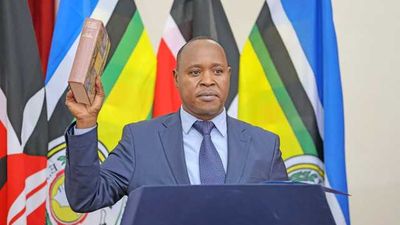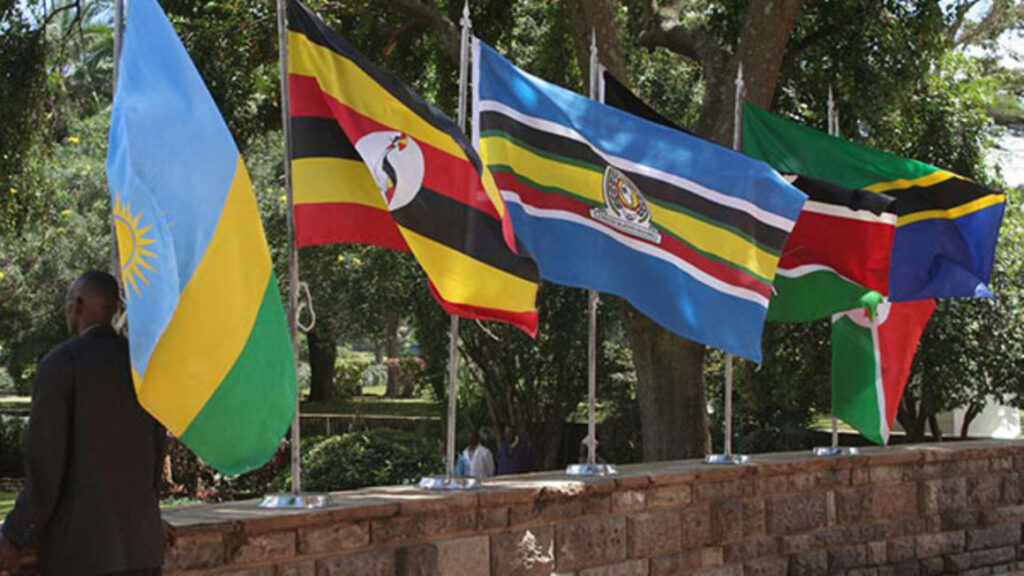Mathuki’s 100days at EAC as Secretary-General. Peter Mutuku Mathuki assumed office as East African Community Secretary-General, on 25 April 2021 for a five-year non-renewable term. It is now 100 days since he replaced Libérat Mfumukeko of Burundi.
The Kenyan business executive came in as the bloc was grappling with several issues, including inadequate staffing in most of the departments, quarrels among partner states and trade disruptions, tariff and non-tariff barriers, among others.
Some of the issues were blamed on the management style of his predecessors, while others were considered beyond the ability of the Secretary-General to solve.
Mathuki has since his appointment launched a system of reporting and accountability, with weekly meetings with all heads of organs, and monthly meetings with heads of institutions.
He also came into office at a time that new governments were taking shape in Tanzania and Burundi, the two partner states that were considered most reluctant towards issues of integration.
But he also came in when the EAC was undergoing the effects of the worst pandemic in recent years, which had so far ravaged the economies for one year.
One of the major things he thought was important, was to reach out to each state individually, and to date, he has met and held talks with the leaders of all the six countries in the 100 days and launched quarterly meetings with individual EAC Affairs ministers.
He says the tours and meetings were meant mainly to get the views of the heads of states, the respective ministries, and the citizens on how the EAC should be run.
Some members of the East Africa Legislative Assembly, EALA, had blamed the previous Secretary-General for not reaching out to leaders of the countries, which affected their interest in the regional affairs, to the extent of accumulating arrears in annual cash contributions. It is hoped that this approach will reverse the trend.
Mathuki says that this program has also improved the image of the secretariat and also revived the interest of the private sector and the civil society in the activities of the bloc.
One of the main projects embarked on is the processing of the application of the Democratic Republic of Congo into the EAC, and a verification team has completed a report on the exercise, ready for submission to the Council of Ministers.
The Secretary-General has shown his full support of the application, describing the DRC’s impending admission, as a game-changer.
On the issue of Covid 19, Mathuki was happy that all the countries have now embarked on vaccination since Tanzania also declared that it was against the pandemic last month. He is however concerned that less than 2 percent of the people are vaccinated, yet it is important for boosting the movement of people, revive business activities, and attract tourists and investors.
Mathuki has also committed to revive and promote the private sector in the region, and since then, he says much has happened, including holding consultative meetings with the leaders.
Technical working groups have been created to help in setting the private sector agenda in the region and to see how to create wealth.
Mathuki is due to meet five top private sector leaders from each partner state this week on the general environment and business requirements, but also discuss Covid 19 with them.
This was followed by the creation of the civil society desk at the secretariat which is aimed at integrating the activities of the NGOs in the process.
On the youth, he says they have launched activities starting with the annual bicycle race around the countries to be used in sensitizing the youth, which he says are an important component to the community.
By the time Mathuki assumed office, there were several issues to do with salaries of staff and allowances and other facilitation of the EALA members, as well as understaffing. EALA members also threatened to protest over allowances ahead of the February Heads of States Summit.
Mathuki says that this has since been handled, while the first recruitment exercise in five years is also ongoing.
On the quarrels between the partner states, including the Uganda- Rwanda conflict and border closure over the last two years, Mathuki is confident that the initiatives in place will lead to the end of the standoff especially since all the EAC leaders are committed to the integration process.
He says that such issues are expected in a community, but adds that the secretariat is handling a process to resolve them, and consultations are ongoing.















































Discussion about this post